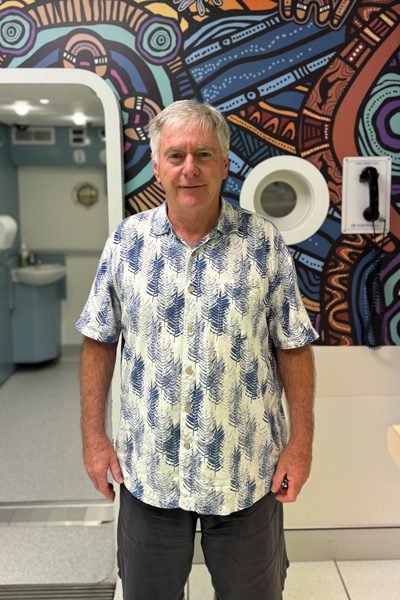Hyperbaric supervisor Bob takes patients on a ‘deep dive’

Bob Campbell stands in front of the RBWH hyperbaric chamber
Bob Campbell is a senior hyperbaric chamber supervisor at Royal Brisbane and Women’s Hospital, but it’s his decorated military background which has led him to where he is today.
After leaving the military in 1986, former Navy clearance diver Bob began a career working offshore where he began his saturation diving course in 1990 in Scotland.
This then kicked off his 20-year career as a saturation diver.
“Saturation diving is where divers live on board a positioned vessel in a helium-oxygen environment for long periods of time, mainly used in the oil and gas industry,” Bob said.
In 2020, Bob took up a role as senior hyperbaric chamber supervisor at Royal Brisbane and Women’s Hospital where he has the important job of supervising patients during their ‘deep diving’ treatment.
Hyperbaric oxygen treatment is the inhalation of 100% oxygen inside a treatment chamber at a pressure greater than sea level.
Breathing in an increased oxygen concentration under pressure is beneficial as it increases the amount of oxygen in the blood, stimulates the growth of new blood vessels, reduces tissue swelling, decreases free gas in the body, slows the production of toxins and kills anaerobic bacteria (bacteria that do not live or grow in the presence of oxygen), promotes healing by increasing oxygen flow to blood deprived tissue.
“The doctors are the ones administering the drug, which is the oxygen, but I am controlling the dive itself which is all done via a computerised panel,” Bob said.
“We monitor the dive constantly by monitoring and calculating what the decompression obligation is, so that it’s not too much pressure for the patients because they don’t have a nitrogen load.
“So, in the end, it was a lot of traveling and you’re taken all around the world in a diving career, it’s nice to be home every night.”
